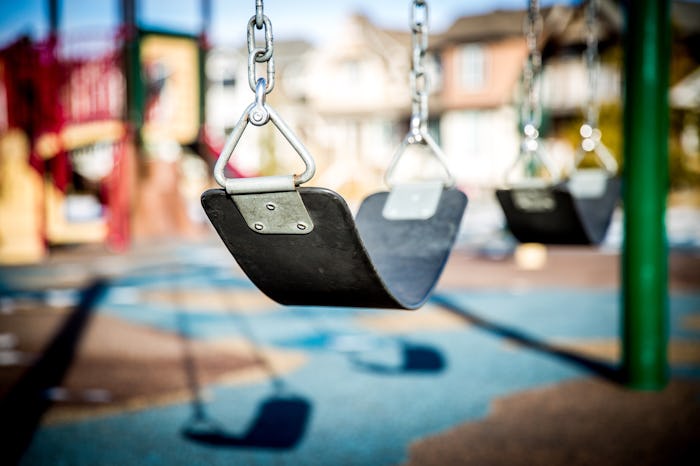Every day after lunch, my friends and I would be the first in line to run outside the double doors leading from the lunchroom to the playground. We had an enormous school yard, and we used it. Unfortunately, kids today aren't always getting the same experience. More and more schools seem to be doing away with recess and outside time, but all the things that happen to kids when they don't get recess seem like a really big deal. Turns out, a lack of recess can have a big effect on your kids.
According to the American Academy of Pediatrics (AAP), recess is a crucial part of a child's day. It's both a gateway to better health and learning by allowing children unstructured play time to develop key social and physical skills, as well as providing them with an outlet to expend excess energy created in the classroom. The AAP notes that with the decline in recess because of the current focus solely on the academic areas of education, students are being done a disservice by the adults caring for them.
Why the cuts? With No Child Left Behind, schools in the United States were mandated to administer several levels of standardized testing, along with a new curriculum, and faced a dilemma — do you study for the tests, or do you let the kids play? It began to be an all-or-nothing, no-win situation, and by 2006, around 40 percent of schools had drastically reduced or eliminated recess entirely, according to The Washington Post.
What does this do to kids? What happens when kids don't get enough recess? According to a study completed by the University of Rochester, students who don't receive adequate play time in their day are likely to experience retarded growth in their cognitive, physical, and psychosocial development. In their study, they found that children who weren't receiving an appropriate amount of recess showed declines in their understanding of social structure, emotional development, language, and had weaker coping mechanisms, overall. The researchers stated that, "the development of social competence is a vital preparatory task during childhood and adolescence, and is linked to future social, academic, and vocational success."
Low-income areas have been affected the most by the cutbacks to recess. According to Stanford University, recess is especially crucial in low-income areas because it leads to children feeling safer and more engaged with their learning. It is also a strong contributing factor to a positive school climate in areas where this is often in short supply. It improves attendance and is linked with better overall academic outcome later in life.
New York City playground and recess advocate, Vicki Stottemeyer, tells Romper in an interview that the time given for recess just isn't enough. "The average New York City elementary school student receives just 20 minutes of recess per day, often the only physical activity the child receives all day, especially if they live in neighborhoods with high crime or gang involvement." I know that my own children, who attend public schools in New York City, tell me that their recess is canceled frequently, and that 20 minutes is generous. My son tells me that by the time they all line up, get ready, and go out, they barely spend any time playing before they're lining up again to get back inside.
I understand my son's not the most reliable judge of time (no 9-year-old is), but, having spoken to his principals, and the school advocate about this, I can tell you that it's true. There's very little time spent in actual play. For kids like my son who have severe ADHD, that time is crucial to their ability to cope with the rest of the work day.
Thankfully, there's a real push to end this. In fact, there's a new pilot program in Texas where students are going out for recess four times per day in hopes to improve academic achievement and student health. The LiiNK Program hopes to inspire children to become more engaged, active, and dynamic students through mandated, unstructured play time throughout the day.
While it's early days, the rising chorus in the fields of child psychology and pediatrics calling out for increased recess and greater funding for equipment and supervision shows that the tide is shifting, and perhaps now our children will be given more opportunities to play and be kids in-between studying for the math and reading tests.
